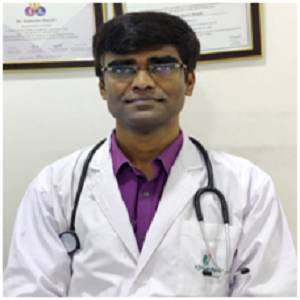Gastroenterology and general surgery deal with the treatment of the esophagus, stomach, small intestine, colon, rectum, as well as the pancreas, gallbladder, bile ducts, and liver.
It entails a thorough understanding of the gastrointestinal organs' normal function (physiology), which includes material movement through the stomach and intestine (motility), digestion and absorption of nutrients into the body, waste removal from the system, and the liver's role as a digestive organ.
A general surgeon may also perform surgeries related to breasts, skin, head, or neck if needed. Visit the best general surgery and gastroenterology hospital in Gwalior, to know more about this medical specialty.
What are the common symptoms associated with gastrointestinal diseases?
The most prevalent signs of gastrointestinal diseases are abdominal pain and indigestion. You may also experience the following symptoms:
- Bleeding from the bowels
- Heartburn
- Vomiting and nausea
- Diarrhea
- Stool which is dark or clay-colored
- Pain in the chest
- Constipation and indigestion
- Appetite loss.
- Loss of weight
- Bloating
- Anemia
If you have any of the above signs or symptoms, visit the best general surgeon and gastroenterologist in Gwalior.
What are the most common causes of gastrointestinal diseases?
The most common causes of stomach ailments are an unhealthy lifestyle and food. Other factors that may contribute to gastric illness include:
- Stress: Stress can cause the adrenal gland to release a hormone called cortisol in response to high amounts of stress. Cortisol can produce nausea, stomach pain, constipation, and a variety of other symptoms when it is released into the bloodstream.
- Bacterial or viral infection: An overgrowth of bacteria or virus entry into the stomach can inflame the stomach and cause a variety of disorders.
- Genetics: If either of your parents or a close family has been diagnosed with stomach cancer or another gastrointestinal condition, you may be at a higher risk of developing it.
- Diabetes: People with type 1 or type 2 diabetes are at an increased risk of developing gastrointestinal illnesses.
When to see a doctor?
If you suffer from any of the above symptoms, your doctor may ask you to visit a gastroenterologist or general surgeon to know more about your condition.
Request an appointment at RJN Apollo Spectra Hospitals, Gwalior
Call: 18605002244
What are the potential side effects of the treatment?
Medication and surgery-related risks include:
- Abdominal bleeding that is excessive
- Infections caused by bacteria
- Blood clotting
- Severe abdominal pain
- Anesthesia-related allergic responses
- Death (rare)
The type of surgery and the severity of the condition determine the long-term risks and problems of gastric surgery. They may include the following:
- Obstruction of the bowels
- Ulcers may appear.
- The abdominal walls have been perforated.
- Gallstones
- A drop in blood sugar level
- Leaks in the gastrointestinal tract
Consult the best gastroenterologist and general surgeon in RJN Apollo Spectra Hospitals, Gwalior, to ensure hassle-free surgery.
What are some of the common surgical or nonsurgical procedures that gastroenterologists and general surgeons perform?
Nonsurgical procedures are performed by gastroenterologists. This can include things like:
- Upper endoscopy: It is a procedure that helps doctors diagnose problems with the food pipe, stomach, and small intestine.
- Endoscopic ultrasounds: They are used to look into the upper and lower GI tract as well as other internal organs.
- Colonoscopies: These are tests that can detect colon cancer or polyps.
- Sigmoidoscopy: It is done to assess the blood loss or pain in the large intestine.
- Liver biopsy: A liver biopsy is used to determine whether the liver is inflamed or fibrotic.
- Capsule Endoscopy: Both capsule endoscopy and double balloon enteroscopy are procedures for inspecting the small intestines.
Surgical procedures are performed by general surgeons. They may include:
- Appendectomies: Appendectomies are performed to remove an inflamed appendix.
- Abdominal wall reconstruction: It is done to reconstruct the abdominal wall, which may be punctured due to an injury or other diseases.
- Cancer removal: If you have a tumor in the gastrointestinal tract, surgery to remove it may be performed.
Conclusion
Gastrointestinal diseases affect many people and can be treated easily. If you see any bleeding in your stools, have undergone trauma, or feel prolonged stomach distress, contact your healthcare provider immediately. Visit the best general surgeon at RJN Apollo Spectra Hospitals in Gwalior for more information.
Gastric disorders can lead to the following problems if left untreated: Severe chest and abdominal pain Bleeding in the stomach or gastrointestinal tract Dehydration Stomach inflammatory disease
If you have gastrointestinal problems, stay away from the following foods: Spicy foods Carbonated and sugary drinks with caffeine Processed or canned foods
The following are some preventative measures for gastrointestinal diseases: Exercise on a regular basis Make sure you get lots of water. High-fiber foods should be consumed. Smaller, more frequent meals are recommended.
Our Doctors
DR. DEVANSH ARORA
MBBS, MS...
| Experience | : | 4 Years Experience |
|---|---|---|
| Speciality | : | General Surgery, Lap... | Location | : | Vikas Nagar |
| Timings | : | ON CALL... |
DR. L.N. ARORA
MBBS, MS...
| Experience | : | 36 Years Experience |
|---|---|---|
| Speciality | : | General Surgery, Lap... | Location | : | Vikas Nagar |
| Timings | : | ON CALL... |
DR SAMIR GUPTA
MBBS,MS,MCH...
| Experience | : | 11 Years Experience |
|---|---|---|
| Speciality | : | General Surgery, Lap... | Location | : | Vikas Nagar |
| Timings | : | Mon - Sat : On Call... |
DR. GOKARAN MANJHI
MBBS, MS, FMAS, FIAG...
| Experience | : | 15 Years Experience |
|---|---|---|
| Speciality | : | General Surgery, Lap... | Location | : | Vikas Nagar |
| Timings | : | Mon - Sat : 10:00 AM... |
DR. DEVANSH ARORA
MBBS, MS...
| Experience | : | 4 Years Experience |
|---|---|---|
| Speciality | : | General Surgery, Lap... | Location | : | Vikas Nagar |
| Timings | : | ON CALL... |
DR. L.N. ARORA
MBBS, MS...
| Experience | : | 36 Years Experience |
|---|---|---|
| Speciality | : | General Surgery, Lap... | Location | : | Vikas Nagar |
| Timings | : | ON CALL... |
DR SAMIR GUPTA
MBBS,MS,MCH...
| Experience | : | 11 Years Experience |
|---|---|---|
| Speciality | : | General Surgery, Lap... | Location | : | Vikas Nagar |
| Timings | : | Mon - Sat : On Call... |
DR. GOKARAN MANJHI
MBBS, MS, FMAS, FIAG...
| Experience | : | 15 Years Experience |
|---|---|---|
| Speciality | : | General Surgery, Lap... | Location | : | Vikas Nagar |
| Timings | : | Mon - Sat : 10:00 AM... |
Our Top Specialities
NOTICE BOARD
CONTACT US
CONTACT US
 Book Appointment
Book Appointment






.svg)
.svg)
.svg)
.svg)








